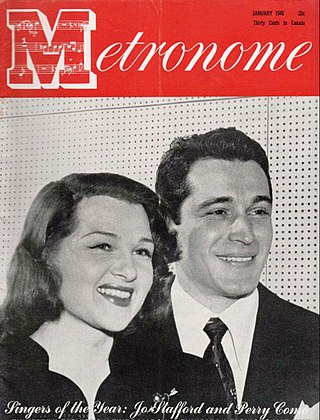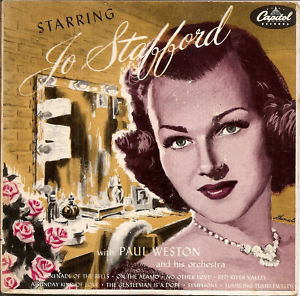
Jo Elizabeth Stafford was an American traditional pop singer, whose career spanned five decades from the late 1930s to the early 1980s. Admired for the purity of her voice, she originally underwent classical training to become an opera singer before following a career in popular music, and by 1955 had achieved more worldwide record sales than any other female artist. Her 1952 song "You Belong to Me" topped the charts in the United States and United Kingdom, becoming the second single to top the UK Singles Chart, and the first by a female artist to do so.

The Pied Pipers are an American popular singing group originally formed in the late 1930s. They had several chart hits throughout the 1940s, both under their own name and in association with Tommy Dorsey, with Johnny Mercer and with Frank Sinatra.

Paul Weston was an American pianist, arranger, composer, and conductor who worked in music and television from the 1930s to the 1970s, pioneering mood music and becoming known as "the Father of Mood Music". His compositions include popular music songs such as "I Should Care", "Day by Day", and "Shrimp Boats". He also wrote classical pieces, including "Crescent City Suite" and religious music, authoring several hymns and masses.
"Begin the Beguine" is a popular song written by Cole Porter. Porter composed the song during a 1935 Pacific cruise aboard the Cunard ocean liner Franconia from Kalabahi, Indonesia, to Fiji. In October 1935, it was introduced by June Knight in the Broadway musical Jubilee, produced at the Imperial Theatre in New York City.

"Smoke Gets in Your Eyes" is a show tune written by American composer Jerome Kern and lyricist Otto Harbach for the 1933 musical comedy Roberta. The song was sung in the Broadway show by Tamara Drasin. It was first recorded by Gertrude Niesen, with orchestral direction from Ray Sinatra, Frank Sinatra's second cousin, on October 13, 1933. Niesen's recording of the song was released by Victor, with in the B-side "Jealousy", a song featuring Isham Jones and his Orchestra. The line "When your heart's on fire, smoke gets in your eyes" apparently comes from a Russian proverb.
"Too Marvelous for Words" is a popular song written in 1937. Johnny Mercer wrote the lyrics for music composed by Richard Whiting. It was introduced by Wini Shaw and Ross Alexander in the 1937 Warner Brothers film Ready, Willing, and Able, as well as used for a production number in a musical revue on Broadway. The song has become a pop and jazz standard and has been recorded by many artists.
"Dancing in the Dark" is a popular American song, with music by Arthur Schwartz and lyrics by Howard Dietz, that was introduced by John Barker with Tilly Losch dancing in the 1931 revue The Band Wagon. The song was first recorded by Bing Crosby on August 19, 1931 with Studio Orchestra directed by Victor Young, staying on the pop charts for six weeks, peaking at #3, and helping to make it a lasting standard.

The Chesterfield Supper Club is an NBC Radio musical variety program (1944–1950), which was also telecast by NBC Television (1948–1950).
"Yesterdays" is a 1933 song about nostalgia composed by Jerome Kern with lyrics by Otto Harbach. They wrote the song for Roberta, a musical based on the novel Gowns by Roberta by Alice Duer Miller. "Yesterdays" was overshadowed by the musical's more popular song, "Smoke Gets in Your Eyes", which was a number one hit for the Paul Whiteman orchestra.
"Just Squeeze Me " is a 1941 popular song composed by Duke Ellington, with lyrics by Lee Gaines. The song has been recorded numerous times by a number of artists in the years since, having become a jazz standard. Hit recordings have been by Paul Weston & His Orchestra and by The Four Aces.
"A Sunday Kind of Love" is a popular song composed by Barbara Belle, Anita Leonard, Stan Rhodes, and Louis Prima and was published in 1946.

Jo Stafford Sings Songs of Scotland is a 1957 album by Jo Stafford. It was released in October 1957 on the Columbia label and features Stafford backed by the Paul Weston Orchestra. Some of the tracks come from the 1954 album Songs of Scotland.The lyrics are all taken from traditional Scottish poetry, many from the work of Robert Burns, with the music written by Alton Rinker.

Starring Jo Stafford is a 1953 album by Jo Stafford, with Paul Weston and His Orchestra and accompaniment by The Starlighters and The Pied Pipers. In 1997, EMI issued it on a CD along with 1950's Autumn in New York.

Ski Trails is a 1956 album by Jo Stafford, with accompaniment by Paul Weston and His Orchestra, The Starlighters, and the Norman Luboff Choir. Most of its songs have a winter theme.
"Alone Together" is a song composed by Arthur Schwartz with lyrics by Howard Dietz. It was introduced in the Broadway musical Flying Colors in 1932 by Jean Sargent.

Jonathan and Darlene Edwards were a musical comedy double act developed by American conductor and arranger Paul Weston, and his wife, singer Jo Stafford. The routine was conceived in the 1950s, and involved Weston playing songs on the piano in unconventional rhythms, while Stafford sang off-key in a high pitched voice. The couple released five albums and one single as the Edwardses, and their 1960 album, Jonathan and Darlene Edwards in Paris won that year's Grammy Award for Best Comedy Album.

Jonathan and Darlene Edwards in Paris is a 1960 comedy album recorded by American singer Jo Stafford and her husband, pianist and bandleader Paul Weston. In character as Jonathan and Darlene Edwards, the pair put their own interpretation on popular songs including "I Love Paris" and "Paris in the Spring." The album followed a successful comedy act the couple would perform at parties during the 1950s, in which Weston would play an out of tune piano while Stafford would accompany him by singing in an off-key and high pitched voice. A joint winner of the 1961 Grammy Award for Best Comedy Album, the album garnered Stafford her only major award for her singing.









